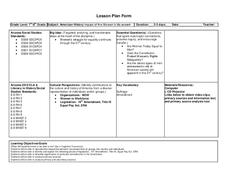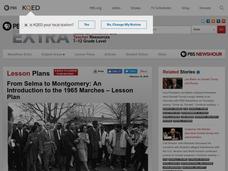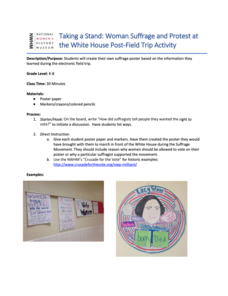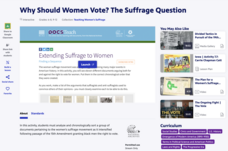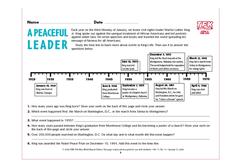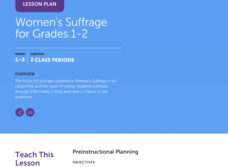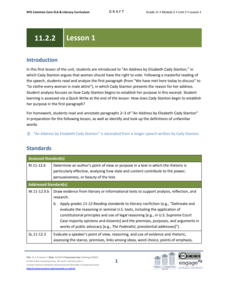Student Handouts
Voting Rights Speech Before Congress
Is your class studying civil rights? Consider taking a look at President Lyndon B. Johnson's voting rights speech. This resource includes an abridged version and three related questions. Pupils consider Johnson's use of language and the...
DC Vote
One Kid, One Vote
Learn about why the citizens of Washington, D.C. feel unrepresented in Congress with an article about D.C voting rights. Individuals read about the movement toward congressional representation in Washington, D.C., before...
PBS
Voting Rights History
Why is voting so important, anyway? Learn more about the importance of exercising a right for which many men and women marched, fought, and legislated with an interactive timeline activity.
Arizona Department of Education
American History Impact of the Women’s Movement
Take a look at important images that depict the women's suffrage movement, the support for the Equal Rights Amendment, and wage equity for women over the last two centuries. As class members work through a lesson on...
PBS
From Selma to Montgomery: An Introduction to the 1965 Marches
The 1965 Civil Rights marches from Selma to Montgomery and the resulting Voting Rights Act of 1965 are the focus of a social studies lesson. The resource uses film clips to inform viewers not only about the discrimination that gave rise...
City University of New York
Analysis Worksheet: The Supreme Court Declares that the Constitution Does Not Protect Women's Right to Vote
In this voting rights activity, students read instructor-assigned pages about the Supreme Court decision that women did not have the right to vote and then respond to 3 short answer questions.
EngageNY
Grade 11 ELA Module 2: Unit 2, Lesson 6
How did the women's rights movement create a ripple effect, improving the lives of future generations? Scholars read and analyze paragraphs 11-12 of "An Address by Elizabeth Cady Stanton," in which the author emphasizes the importance of...
The Guardian
A Timeline of Women's Right to Vote
Which countries implemented women's suffrage before the 19th amendment went into effect in the United States? Which countries still do not allow women to vote? Watch the global spread of women's rights in an interactive timeline...
National Woman's History Museum
Taking a Stand: Woman Suffrage and Protest at the White House K-8
A class discussion opens a lesson on women suffragettes. Learners imagine they are preparing to protest for women's voting rights. Scholars create a colorful poster to hold up high when marching in front of the White House.
National Woman's History Museum
Propaganda and Women's Suffrage
Americans who backed the suffragist movement used posters to gain the support of others for their cause. Class members analyze the visual imagery and propaganda devices used in a variety of these posters. In addition, groups examine how...
PBS
Why Should Women Vote? The Suffrage Question
An online interactive activity asks learners to analyze a group of documents related to the women's suffrage movement and then place the documents on a timeline. The results assess users understanding of the progression of the women's...
Time For Kids
A Peaceful Leader
The legacy of Dr. Martin Luther King, Jr's life and message is just as important today as it was in his lifetime. Introduce elementary learners to the movement for civil rights with a timeline of Dr. King's life, as well as...
Scholastic
Women's Suffrage for Grades 1–2
Scholars take part in a grand conversation after they examine facts and stories about the Women's Suffrage Movement. Eight discussion questions bring light to influential women, the importance of voting, citizenship, and voting rights.
EngageNY
Grade 11 ELA Module 2: Unit 2, Lesson 2
How did Elizabeth Cady Stanton advocate for women's rights? Pupils consider this question as they continue reading "An Address by Elizabeth Cady Stanton." They complete a Quick Write, analyzing how satire and sarcasm advance the author's...
National Endowment for the Humanities
Women's Suffrage: Why the West First?
Eleventh graders discuss the granting of voting rights to women in several Western states. They take a stand, supported by historical evidence, as to whether or not a single theory explains why Western states were the first to grant full...
EngageNY
Grade 11 ELA Module 2: Unit 2, Lesson 1
How did Elizabeth Cady Stanton use rhetoric to convince others of her views? Scholars begin reading "An Address by Elizabeth Cady Stanton," which argues that women should have voting rights. Pupils complete a Quick Write to analyze how...
National Woman's History Museum
State vs. Federal Campaigns
Campaigns to gain voting rights for women during the 19th and 20th centuries took place on both the state and federal level. After examining primary sources that document both types of campaigns, class members debate the merits of the...
NPR
Suffrage Lesson Plan
Has life changed for American women in the last century, or are there common themes between the lives of 21st century women and the struggle of suffragettes from the 1910s? Explore the ways media reflects the position of women...
City University of New York
The Split Over Suffrage
Compare and contrast Frederick Douglass's and the National Women's Suffrage Association's stances on equal rights and suffrage with a series of documents and worksheets. Learners work together or independently to complete the packet, and...
EngageNY
Grade 11 ELA Module 2: Unit 2, Lesson 8
Using the resource, pupils consider how the author structures her argument in "An Address by Elizabeth Cady Stanton." Scholars complete a written response to identify one of Cady Stanton's claims and analyze how she uses reasoning and...
National Woman's History Museum
Susan B. Anthony: She's Worth a Mint!
A instructional activity all about Susan B. Anthony showcases the Civil Rights leader's contributions towards equality. A Susan B. Anthony coin sparks engagement. Scholars take part in a discussion that sheds light on what being an agent...
Walt Disney Company
Elizabeth Started All the Trouble
Elizabeth Cady Stanton was a famous suffragette that paved the way for equal rights for women. Readers respond to before, during, and after reading questions based on her story. The resource is a great addition to a instructional...
EngageNY
Grade 11 ELA Module 2: Unit 2, Lesson 3
What is the distinction between rights and equality? Scholars continue their analysis of "An Address by Elizabeth Cady Stanton" using the third instructional activity from the 14-part Grade 11 ELA Module 2: Unit 2 series. Pupils complete...
NPR
Progressive Era Lesson Plan
The women working for equal rights in the early 20th century weren't a part of one large group; rather, they were members of dozens of small groups focused on social reform. Explore the ways groups in the Progressive Era like National...



